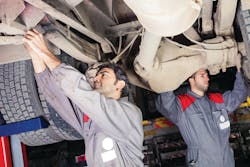Ways to improve any vehicle maintenance operation
Much has been said and written about success and achieving success. Consider this statement by former U.S. Secretary of State, Colin Powell: “There are no secrets to success. It is the result of preparation, hard work and learning from failure.”
Today’s challenging world of transportation and logistics demands technical excellence for business success. Shipper expectations, government regulations, technological advances and CSA compliance issues all require commercial vehicle fleets to be ever vigilant in order to stay safe, efficient and profitable.
Smart fleets are constantly examining and refining their operations and vehicle maintenance programs. Many of these fleets turn to the American Trucking Associations’ Technology & Maintenance Council (TMC) to help them make smart business decisions on maintenance and spec’ing issues.
Furthermore, many fleets have made significant technological investments in recent years, and are just now beginning to reap substantial rewards for their efforts.
To help fleets attain similar benefits, the TMC has designed this year’s annual fall meeting around the theme Celebrating Technical Achievement. The meeting is set for Sept. 22 to 25 at the Walt Disney Swan and Dolphin Resort and Convention Center in Orlando, FL.
With its diverse membership of equipment managers, service dealers, owner operators, industry suppliers and manufacturers, educators, academia and others that support the trucking industry, TMC (tmc.trucking.org) works together to improve transport equipment, its maintenance and maintenance management. It is a technical council of American Trucking Associations (www.trucking.org) – the largest national trade association for the trucking industry.
TECHNICAL SESSIONS
The TMC 2014 Fall Meeting features a comprehensive collection of equipment-related educational sessions. There are three sessions set for this year:
Lean Principals: The application of Structured Problem Solving to Maintenance. This session is all about overcoming the challenges of “comebacks.” Attendees will learn how to employ a structured approach to problem solving using a practice known as “Lean.” This is a team-based, disciplined approach to permanent problem resolution.
Lean principles are generally based on an eight-step methodical approach in which an organization:
- Identifies the problem or need.
- Understands the current state or situation.
- Develops the goal statement.
- Performs a root cause analysis.
- Brainstorms/determines countermeasures.
- Creates a countermeasures implementation plan.
- Checks the results and confirms the effects.
- Updates an organization’s standard work procedures.
Session attendees will learn how these concise and effective Lean principles can be successfully adapted to fleet maintenance and vehicle/component manufacturing operations.
TMC’s Fleet Executive Panel. A special panel of industry fleet executives will address hot-button issues that most concern today’s fleet managers. They will share their thoughts and opinions on a range of topics, including spec’ing for fuel economy and efficiency, trade cycles and warranty coverage and recovery.
They will also cover various aspects of preventive maintenance; strategies for maximizing shop personnel and resources; and possible future fuels and powertrains and how that will impact fleet operations.
Maintenance and Liability Issues: A Mock Trial. This session focuses on maintenance liability litigation. Even though this topic isn’t something any fleet executive wants to think about, it’s important to prepare because operation can be sued, and the damage that can result from legal battles can be crippling.
Attendees will learn about protective measures that can be taken to defend their company as a panel of attorneys from the Trucking Industry Defense Association engage in a mock trial which will cover such matters as:
- How can a fleet maintenance manager protect himself from being the target of a costly lawsuit?
- What policies should a carrier adopt for protection?
- In the event of an accident, where does the liability of the fleet end, and that of the manufacturer begin?
- What questions should a fleet maintenance manager be prepared to answer during an investigation or deposition?
- What is personal liability?
STUDY GROUP SESSIONS
TMC Study Groups are standing committees that identify problems and challenges facing motor carriers and other truck equipment users. These groups, which are long-term in nature, study a specific sector of truck technology or management.
Among the TMC Study Group meetings taking place at this year’s TMC fall meeting are:
The Future of Dual Voltage (12/24/48 Volt) Electrical Systems for Commercial Trucks. This session will shed some light on the new electrical system and starting and charging system designs that are being considered for the next generation of trucks, and what they will mean for fleet operations.
Tire and Wheel Failure Analysis. A panel of experts will diagnose tire and wheel conditions. Plus, they will review the telltale signs and symptoms present when tires and wheels fail and explain how to read them to determine the true causes of failure. Other subjects to be addressed: irregular tread wear, failed tires, retread failures and failed fasteners and out-of-service wheels.
Aftertreatement Challenges: Experiences and Best Practices from the Fleet Perspective. The new wave of emissions and fuel efficiency regulations on the horizon that technicians and managers will need to learn about to stay a step ahead will be discussed. This session will also cover fleet experience with service providers and manufacturers of emissions aftertreatment systems for heavy duty diesels regarding warranty and related issues, how effective the OEM service provider network is in addressing aftertreatment issues and parts availability concerns.
Does High Torque Plus Gear Low Equal Equipment Disaster? Newer vehicle designs are prompting second thoughts regarding the prior approach of, “gear fast, run slow,” for optimum fuel economy. In this session, drivetrain experts will recommend new ideals for drivetrain spec’ing option to optimize efficiency and longevity.
Trailer Talk. Moderators will facilitate a discussion on trailer maintenance and specification issues. During this open discussion, attendees are encouraged to bring up pressing concerns and to share insights.
Expected and Potential Fleet Impact of Phase 1 and 2 of Greenhouse Gas Regulations. TMC has invited the EPA and other government regulators to receive feedback from fleets on what NHTSA and EPA are proposing to meet President Obama’s fuel efficiency and greenhouse gas emissions directive. Members who attend this session will hear what areas of trucking Phase 2 may address and what fleets have to say about the impact of Phase 1. Plus, attendees will be able to express their thoughts on the not yet drafted Phase 2 regulations.
Improper Mating Procedures: Corrosion Prevention at Wheel-To-Hub Mating Surfaces. This session will address actions that fleets can take at wheel-to-hub mating surfaces to prevent corrosion. Maintenance, inspection and cleaning of wheels, wheel fasteners and wheelend components will also be covered.
Failure Analysis for Light, Medium and Vocational Trucks. This will be a facilitated discussion on a version of the Council’s “Shop Talk” dedicated solely to failure analysis for Class 2 through 6 trucks and vocational vehicles. Experts will be on-hand to diagnose failed components from systems such as hydraulics, bodies, liftgates and other vehicle systems pertaining to the special needs of these types of vehicles.
Dedicated Short-Range Communications and Other Wireless Technologies: What Will It Mean for My Fleet? This session will showcase how systems such as dedicated short-range communications (DSRC) and other wireless technologies work and what their application to commercial vehicle operations will soon mean for fleets. Panelists will discuss how the technology is being implemented and what potential benefits and risks exist for fleets; the costs associated with this adoption; and the potential legal repercussions associated with these initiatives will also be covered.
Complete details on the fall meeting, plus registration information, can be found at tmc.trucking.org or by calling TMC at 703-838-163.

